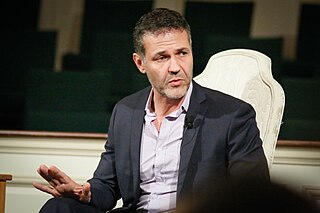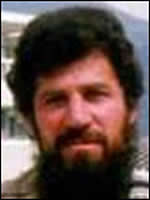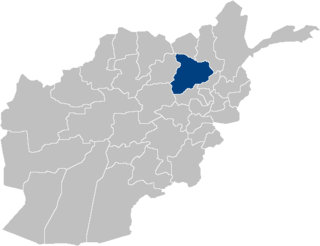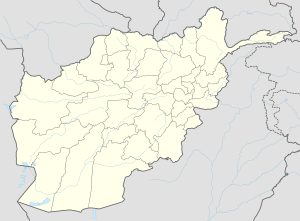
Hamid Karzai is an Afghan statesman who served as the fourth president of Afghanistan from July 2002 to September 2014, including as the first elected president of the Islamic Republic of Afghanistan from December 2004 to September 2014. He previously served as Chairman of the Afghan Interim Administration from December 2001 to July 2002. He is the chief (khān) of the Popalzai Durrani tribe of Pashtuns in Kandahar Province.

The International Security Assistance Force (ISAF) was a multinational military mission in Afghanistan from 2001 to 2014. It was established by United Nations Security Council Resolution 1386 according to the Bonn Agreement, which outlined the establishment of a permanent Afghan government following the U.S. invasion in October 2001. ISAF's primary goal was to train the Afghan National Security Forces (ANSF) and assist Afghanistan in rebuilding key government institutions; it gradually took part in the broader war in Afghanistan against the Taliban insurgency.

The Durand Line, also known as the Afghanistan–Pakistan border, is a 2,640-kilometre (1,640 mi) international border between Afghanistan and Pakistan in South Asia. The western end runs to the border with Iran and the eastern end to the border with China.

David Jude Heyworth Law is an English actor. He began his career in theatre before landing small roles in various British television productions and feature films. Law gained recognition for his role in Anthony Minghella's The Talented Mr. Ripley (1999), for which he won the BAFTA Award for Best Actor in a Supporting Role and was nominated for an Academy Award for Best Supporting Actor.
John Fisher Burns is a British journalist, and the winner of two Pulitzer Prizes. He was the London bureau chief for The New York Times, where he covered international issues until March 2015. Burns also frequently appears on PBS. He has been called "the dean of American foreign correspondents."

Gordon James O'Connor, is a retired brigadier-general, businessman, and lobbyist, who served as Conservative Member of Parliament from 2004 to 2015.

Khaled Hosseini is an Afghan-American novelist, UNHCR goodwill ambassador, and former physician. His debut novel The Kite Runner (2003) was a critical and commercial success; the book and his subsequent novels have all been at least partially set in Afghanistan and have featured an Afghan as the protagonist. Hosseini's novels have enlightened the global audience about Afghanistan's people and culture.

The Hezb-e-Islami Gulbuddin, also referred to as Hezb-e-Islami or Hezb-i-Islami Afghanistan (HIA), is an Afghan political party and paramilitary organization, originally founded in 1976 as Hezb-e-Islami and led by Gulbuddin Hekmatyar. In 1979, Mulavi Younas Khalis split with Hekmatyar and established his own group, which became known as Hezb-i Islami Khalis; the remaining part of Hezb-e Islami, still headed by Hekmatyar, became known as Hezb-e Islami Gulbuddin. Hezbi Islami seeks to emulate the Muslim Brotherhood and to replace the various tribal factions of Afghanistan with one unified Islamic state. This puts them at odds with the more tribe-oriented Taliban.

Nashwan Abdulrazaq Abdulbaqi al-Tamir, better known as Abd al-Hadi al-Iraqi is an Iraqi member of Al-Qaeda who is now in United States custody at Guantanamo Bay detention camp in Cuba.

Below is the disposition and structure of international military forces that were participating in the War in Afghanistan in November 2012, listing deployed units under the command of the International Security Assistance Force (ISAF), which controlled both combat and reconstruction operations. During its existence from 2001 to 2014, despite the photos in this article only showing American soldiers, marines and sailors, the ISAF comprised units from many countries, including: Albania, Armenia, Australia, Belgium, Canada, Croatia, Czech Republic, Estonia, Finland, France, Georgia, Germany, Hungary, Italy, Latvia, Lithuania, Macedonia, Netherlands, New Zealand, Norway, Poland, Romania, South Korea, Spain, Sweden, Turkey, United Kingdom and others. In this article, units are assumed to be from the United States unless otherwise stated. This list is a rough and unofficial listing of units and formations.

Operation Herrick was the codename under which all British operations in the War in Afghanistan were conducted from 2002 to the end of combat operations in 2014. It consisted of the British contribution to the NATO-led International Security Assistance Force (ISAF), and support to the American-led Operation Enduring Freedom (OEF), within the country.

Operation Achilles was a NATO operation, part of the War in Afghanistan. Its objective was to clear Helmand province of the Taliban. The operation began on March 6, 2007. The offensive is the largest NATO-based operation in Afghanistan to date. NATO officials reported that, contrary to previous operations, Taliban fighters were avoiding direct confrontation in favor of guerilla tactics.
Ghaziabad District is in the northern part of Kunar Province, Afghanistan. It was created in 2004 from the northern part of Bar Kunar District. It was named after the Khan of Ghaziabad, Amir Muhammad Ghazi Khan Shaheed. Its population is 7,500 (2004).

The 2007 Baghlan sugar factory bombing occurred on November 6, 2007, when a bomb exploded in the centre of Baghlan, Afghanistan, while a delegation of parliamentarians was visiting, killing at least 72 people including several lawmakers.
Operation Harekate Yolo was a two-part military operation involving NATO ISAF and Afghanistan government forces against the Taliban as part of the War in Afghanistan.
The Badaber uprising was an armed rebellion by Soviet and Afghan prisoners of war who were being held at the Badaber fortress near Peshawar, Pakistan. The prisoners fought the Afghan Mujahideen of the Jamiat-e Islami party in an attempt to escape.
Mandol District is a district of Nuristan Province in eastern Afghanistan. It was originally in Laghman Province and then was moved to the newly created Nuristan Province in 2001.

Mary Akrami is the director of the Afghan Women Skills Development Center. She represented Afghan civil society at the 2001 Bonn Conference. In 2003 the Afghan Women Skills Development Center opened the first women's shelter in Kabul, Afghanistan. The shelter provides legal advice, literacy classes, psychological counseling, and basic skills training to women who need them. Akrami is on call 24 hours a day at the shelter, and under her leadership some of the women there have denounced their abusers publicly and filed court cases against them, something that had been almost unheard of in Afghanistan previously. She has faced threats for her work.













